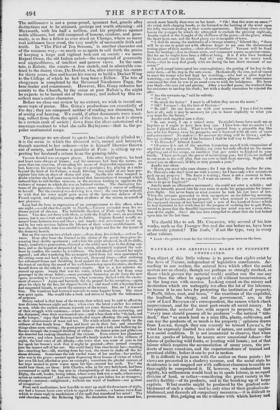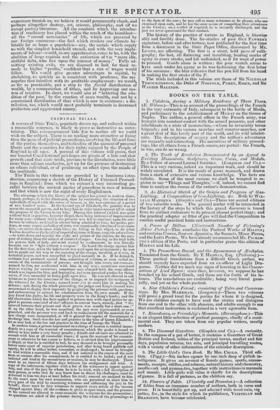NATURAL AND ARTIFICIAL RIGHT OF PROPERTY CONTRASTED.
THE object of this little volume is to prove that rights exist by the laws of Nature, independent of legislative enactments. Ac- cording to our author, the natural laws which affect the social system are as clearly, though not perhaps so strongly marked, as those which govern the material world; neither can the one any more than the other be opposed at all without inconvenience, or in the long-run with success. Looking round on the misery and destitution which are unhappily tco often the lot of the labourer, he traces it to our laws for protecting the institution of property. " Profit, tithes, rent, and taxes," "tire exactions of the capitalist, the landlord, the clergy, and the government," are, in the view of Lord BROUGH Ares correspondent, the causes which check improvement, and for the most part create all social misery. In his opinion, the natural law, with respect to property, is, that " every man should possess all he produces "—the natural " title- deed," that " as much land as a man tills, plants, cultivates, and can use the products of, so much is his property ;" opinions drawn from LOCKE, though they can scarcely be termed LoexE's, for what he expressly limited to a state of nature, our author applies to a social condition. It is not immaterial to observe, that when LOCKE speaks of labour, he means mere unassisted labour—the labour of gathering wild fruits, or hunting wild beasts ; not of that labour which requires the accumulation of many years, the pro- ducts of many countries, and the superintendence of trained and practised ability, before it can be put in motion. It is difficult to join issue with the author on these points : his views are presented in a shadowy manner, and the social state he desidemtes is not mapped out with sufficient clearness to enable us thoroughly to comprehend it. If, however, we understarul him rightly, his millennium would land us in spade labour, in an equal division of land, or rather—considering the great variety in the earth's fertility—of its products, and in the breaking up of large capitals. What results might be produced by the gradual esta- blishment of such a state,—and he only aims at their gradual esta- blishment, and discards all compulsory measures,—it is. difficult to pronounce. But, judging on the evidence with Ishich. history and experience furnish us, we believe it would permanently check, and perhaps altogether destroy, art, science, philosophy, and (if we except poetry) literature. All the comforts which the introduc- tion of machinery has placed within the reach of the humblest— all the "second necessaries" of life, which are procured by our foreign commerce—the fuel which renders our climate ha- bitable for so large a population—nay, the metals which supply us with the simplest household utensil, and with the very imple- ments of labour—would, in our apprehension, cease to be, with the abolition of large capitals and the extinction of tie "mere idle, slothful dolts, who live upon the interest of money." Fully ad- mitting existing evils, we are disposed to look for their re- medy in higher "profits," confident that a rise of wages would follow. We would give greater advantages to capital, by abolishing, as quickly as is consistent with prudence, the mo nopolies that interfere with its profitable employment : we would, as far as practicable, put a stop to the forced distribution of wealth, by a commutation of tithes, and by improving our sys- tem of taxation. In short, we would aim at "bettering the con- dition of the poor," by the creation of more wealth, and not by a constrained distribution of that which is now in existence; a dis- tribution, too, which would most probably terminate in decreased production and aggravated misery.



























 Previous page
Previous page